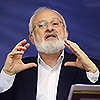Keep Us under the Protection of the Torah
 All the work is only where there are two ways, as we have found, And he shall live in them, and he shall not die in them (Baal HaSulam, Shamati 188 “All the Work Is Only Where There Are Two Ways – 2”).
All the work is only where there are two ways, as we have found, And he shall live in them, and he shall not die in them (Baal HaSulam, Shamati 188 “All the Work Is Only Where There Are Two Ways – 2”).
Question: Why is it said that we have two ways? After all, we only have one way, the way of Kabbalah.
Answer: The point is that we must observe the laws of the higher world that governs us. Within it, there are conditions that allow transgressing various requirements except for the three commandments.
The main one is that the Creator is one, unique, unified, and there is none else beside Him. Therefore, first of all, one must adhere to this and work on this commandment. And everything else depends on the states a person inhabits.
Therefore, it is written that all our work is only in the place where there are two ways: whether to fulfill the commandments or not. As it is said: “And they shall live in them, and not die in them.”
This means that we cannot approach the sanctification of the Creator in things that do not require it, and the notion of “die but not transgress” applies only to the three commandments called incest, bloodshed, and idolatry. We find that the first righteous ones gave their lives to fulfill them.
That is, everything a person must do, and he stands by it, is to devote all his efforts to fulfilling the commandments or even go even to death. This is our entire work because at the time when a person must observe the Torah, the heavy burden is revealed, i.e., the entire weight of its execution. And at the time when the Torah protects a person, it is not so difficult for him.
As it is said, a person’s soul shall teach him. When a person moves forward and various means for further advancement are revealed to him, this is called the Torah teaching and protecting him.
[326997]
From the Daily Kabbalah Lesson 3/19/24, Writings of Baal HaSulam “All the Work Is Only Where There Are Two Ways – 2”
Related Material:
Living by the Laws of the Torah
Are We Guarded From Above? Part 8
Torah—The General Laws of Communication















